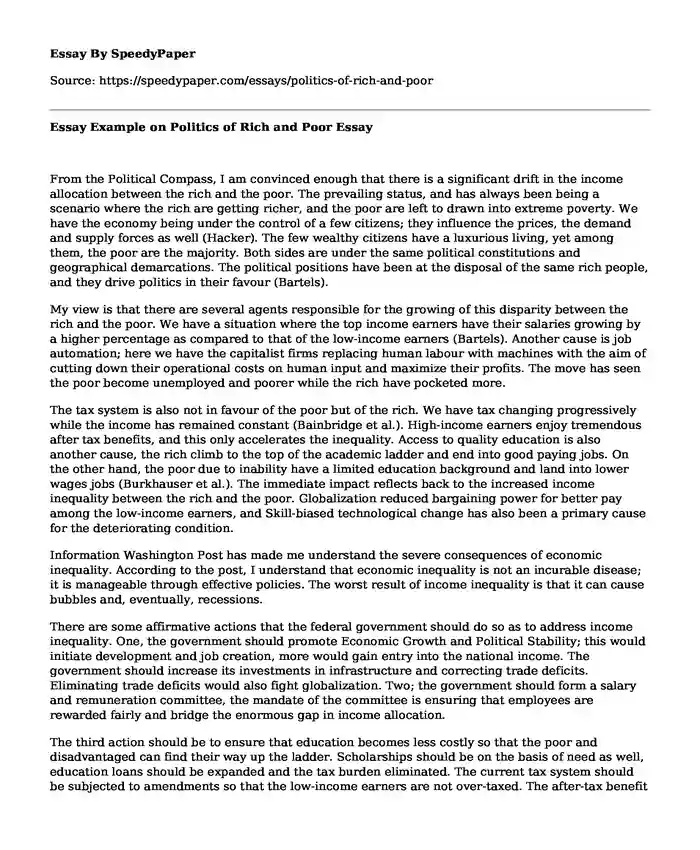From the Political Compass, I am convinced enough that there is a significant drift in the income allocation between the rich and the poor. The prevailing status, and has always been being a scenario where the rich are getting richer, and the poor are left to drawn into extreme poverty. We have the economy being under the control of a few citizens; they influence the prices, the demand and supply forces as well (Hacker). The few wealthy citizens have a luxurious living, yet among them, the poor are the majority. Both sides are under the same political constitutions and geographical demarcations. The political positions have been at the disposal of the same rich people, and they drive politics in their favour (Bartels).
My view is that there are several agents responsible for the growing of this disparity between the rich and the poor. We have a situation where the top income earners have their salaries growing by a higher percentage as compared to that of the low-income earners (Bartels). Another cause is job automation; here we have the capitalist firms replacing human labour with machines with the aim of cutting down their operational costs on human input and maximize their profits. The move has seen the poor become unemployed and poorer while the rich have pocketed more.
The tax system is also not in favour of the poor but of the rich. We have tax changing progressively while the income has remained constant (Bainbridge et al.). High-income earners enjoy tremendous after tax benefits, and this only accelerates the inequality. Access to quality education is also another cause, the rich climb to the top of the academic ladder and end into good paying jobs. On the other hand, the poor due to inability have a limited education background and land into lower wages jobs (Burkhauser et al.). The immediate impact reflects back to the increased income inequality between the rich and the poor. Globalization reduced bargaining power for better pay among the low-income earners, and Skill-biased technological change has also been a primary cause for the deteriorating condition.
Information Washington Post has made me understand the severe consequences of economic inequality. According to the post, I understand that economic inequality is not an incurable disease; it is manageable through effective policies. The worst result of income inequality is that it can cause bubbles and, eventually, recessions.
There are some affirmative actions that the federal government should do so as to address income inequality. One, the government should promote Economic Growth and Political Stability; this would initiate development and job creation, more would gain entry into the national income. The government should increase its investments in infrastructure and correcting trade deficits. Eliminating trade deficits would also fight globalization. Two; the government should form a salary and remuneration committee, the mandate of the committee is ensuring that employees are rewarded fairly and bridge the enormous gap in income allocation.
The third action should be to ensure that education becomes less costly so that the poor and disadvantaged can find their way up the ladder. Scholarships should be on the basis of need as well, education loans should be expanded and the tax burden eliminated. The current tax system should be subjected to amendments so that the low-income earners are not over-taxed. The after-tax benefit should be standardized across all income earners so that we do not have some favoured and others abused by the system.
The government should also come up with policies that encourage work sharing during low seasons to avoid laying off employees. The entirely employment policy should be implemented fully so that a match between the number of job seekers and opportunities available exists (Hacker).
References
Bainbridge, Jay et al. 'Who Gets An Early Education? Family Income And The Enrollment Of Three- To Five-Year-Olds From 1968 To 2000*'. Social Science Q 86.3 (2005): 724-745. Web.
Bartels, Larry M. 'Is The Water Rising? Reflections On Inequality And American Democracy'. PS: Political Science & Politics 39.01 (2006): n. pag. Web.
Burkhauser, Richard V. et al. 'Recent Trends In Top Income Shares In The United States: Reconciling Estimates From March CPS And IRS Tax Return Data'. Review of Economics and Statistics 94.2 (2012): 371-388. Web.
Hacker, Jacob S. 'Inequality, American Democracy, And American Political Science: The Need For Cumulative Research'. PS: Political Science & Politics 39.01 (2006): n. pag. Web.
Cite this page
Essay Example on Politics of Rich and Poor. (2019, May 27). Retrieved from https://speedypaper.com/essays/politics-of-rich-and-poor
Request Removal
If you are the original author of this essay and no longer wish to have it published on the SpeedyPaper website, please click below to request its removal:
- Free Essay Describing Firms in International Trade
- Film-Making Analysis Essay Example
- Free Essay: Where to Stay Safe from Dinosaurs in Emporia
- Essay Example on How People Incorporate Organic Foods Into Their Diet
- Essay Sample on Importance of Business Sustainability
- Paper Example. Rome as an Empire and a Republic
- Free Essay Example on Media Reporting and Racism
Popular categories





